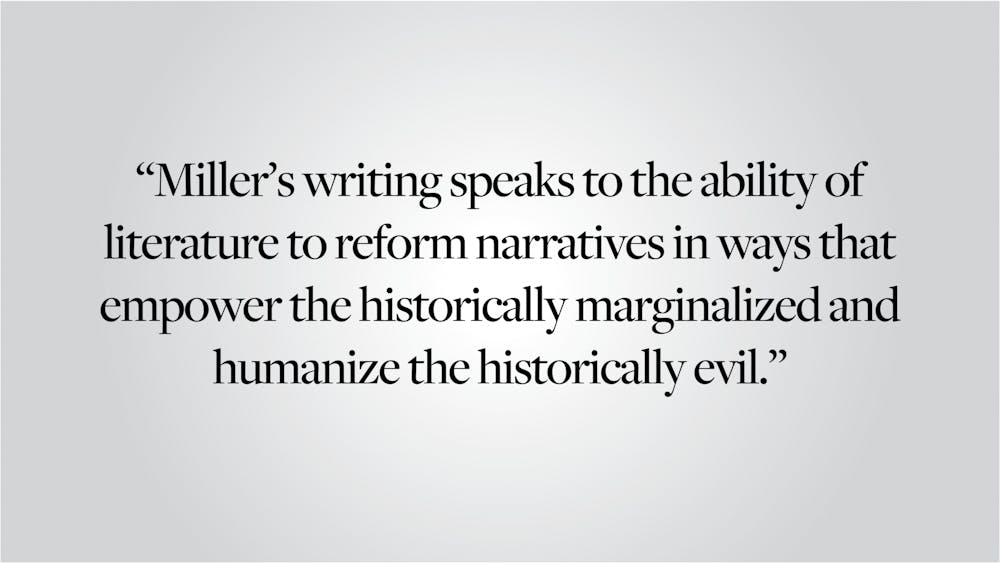The fantastical stories we all hear about as kids — Greek myths, fairy tales and Disney princesses — often recycle overdone gendered tropes featuring a male hero, an evil villain and a beautiful damsel in distress. These narratives play into outdated gender roles and power structures unrepresentative of real people and relationships, especially in an increasingly fluid and progressive world. But modern literature and art has provided an invaluable opportunity to destabilize these overbearing power structures that narrative and history have spent an eternity reinforcing. Madeline Miller ’00 MA ’01 — author, teacher and, most importantly, my favorite Brown alum — is an example of an author whose work offers the chance to subvert such common assumptions. Her novels “Song of Achilles” and “Circe” retell popular Greek mythology in unconventional ways and through previously unheard-from perspectives. In doing so, Miller subverts common assumptions perpetuated by famous Greek myths — proving the invaluable impact that literature can have on reimagining power, gender, oppression and perspective.
“Song of Achilles,” arguably Miller’s most well-received novel, turns the popular story of Trojan War hero Achilles on its head by explaining his life from the point of view of Achilles’s lesser-known best friend, Patroclus. In doing so, Miller undermines the hyper-masculine, heroic archetype common in most narratives of Achilles. The novel, while staying true to the story Greek mythology lovers know, centers around a character and a love story ripe with child-like passion, insecurity and naivety. Patroclus is often overlooked in other Greek myths but stars in this one, and through his mind readers are introduced to flawed, undeniably human characters that are both everything and nothing like those in the historically popular stories. We hear about Patroclus’s and Achilles’s motivations for what they do, and about how so many of those motivations were tied to love — an emotion that has always been associated with instability and femininity.
It is almost shocking to read about Achilles’s vulnerable humanity amidst popular narratives that herald him as a rugged, courageous and relentless war hero. But it is crucial. Through “Song of Achilles,” Miller undermines the all-too-common tendency in hero stories to conflate masculinity with the utter inability to be vulnerable, insecure or loving. The retelling reminds us that heroism and love should never be gendered. All the while, Miller stays authentic to the characters and story from popular Greek mythology. In turn, she paves a path for reimagining literature to challenge traditional norms.
“Circe,” Miller’s other widely-known novel and my personal favorite, similarly destabilizes gendered tales that represent powerful, non-feminine women as evil and one-dimensional. The novel follows the story of Circe, a sorceress in ancient Greek mythology who has been banished to a deserted island due to her witchcraft. In most Greek myths, Circe is seen as evil and malicious, known and feared for turning the men who dared to visit her island into pigs. Miller chooses a different approach: Through Circe’s eyes, readers are taken through her complex life, complete with an abusive family, traumatic experiences with men, a fear of abandonment and a tendency to love.
As I read “Circe,” I found myself wondering why I never questioned what exactly made Circe so angry in the prevailing mythological narratives that I’d grown up hearing about. That is because traditionally, popular retellings of Circe reflect the tendency in literature to give a woman power at the expense of her femininity. In literature, when a woman is dominant, strong and feared, they often lose something else — their beauty, their virtue, their sexuality and everything that is associated with their womanhood. Like Circe, they are demonized to preserve a patriarchy that relies on the domination of anyone who is not a man. Miller’s retelling of Circe’s story thus forces us to reconsider the narratives that uphold this reductive view of femininity and womanhood. Like the characters in “Song of Achilles,” Circe’s beautiful, flawed emotion and vulnerability are what make her distinctly human — despite being immortal — and thus so easy to be loved.
In her retelling of Greek myths, Miller’s writing speaks to the ability of literature to reform narratives in ways that empower the historically marginalized and humanize the historically evil. Both the traditional tales of Achilles and Circe, at least as they are known today, are informed by reductive, patriarchal and oppressive views on gender, heroism and love. But through the simple act of telling a story, Miller’s writing reveals an invaluable ability to alter and reimagine narratives of domination and power. She shows us that it is possible to love a story while recognizing the context behind it and to empathize with characters while criticizing the way they have been portrayed. We can all learn something from her writing — without art like hers, we would be less able to question narratives that perpetuate harmful systems of power. Miller is thus charting a future for literature that can tell compelling stories while making sure they teach lessons more reflective of our more progressive world.
Melissa Liu ’25 can be reached at melissa_y_liu@brown.edu. Please send responses to this opinion to letters@browndailyherald.com and other op-eds to opinions@browndailyherald.com.





